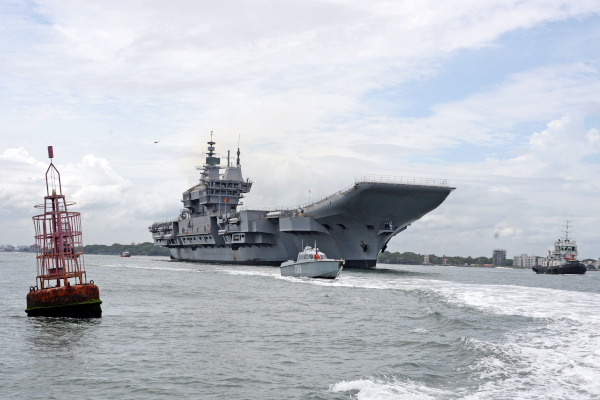India’s first indigenous aircraft carrier (IAC-1) Vikrant will sail out for the second phase of sea trials in October end.
A report in The Hindu says aircraft carrier Vikrant could be handed over to the Indian Navy in April 2022 and commissioned in August 2022.
In the second phase of the trials, a thorough check would be performed on the complete habitat, including each of the over 2,300 compartments.
During the first phase of trials, the performance of Vikrant’s hull, main propulsion, power generation and distribution and auxiliary equipment were tested, and the results were “extremely satisfactory”.
“..the engine showed 100% performance and some issues which had come up were being addressed,” the report says, citing officials.
The navy, which operates Russian-origin MiG-29K fighters from its only operational aircraft carrier Vikramaditya, does not have enough aircraft to operate from both carriers. It had issued a ‘request for information’ in 2017 for the procurement of 57 twin engine carrier fighters.
Earlier, the navy had also aligned its fighter procurement plan with that of the Indian Air Force and cut the number to 36. While the responses it has received from manufacturers are being evaluated, the navy may reduce the number further, the report says.
Trials of the fighter jets in the fray — Boeing F/A-18 Super Hornet, Dassault Aviation Rafale and Saab Gripen-E — are also being planned. The trials will first be conducted on the Shore Based Test Facility (SBTF) in Goa and then on the aircraft carrier, the report says, citing officials.
Boeing’s F/A-18 Super Hornet has already demonstrated the ability to take off from a ski-jump. In tests conducted in August 2020 at the Patuxent River Naval Air Station in Maryland, US, it took off from a ski-jump platform, demonstrating its compatibility with the Indian Navy’s Short Take Off But Arrested Recovery (STOBAR) aircraft launch system.
Work also continues on India’s indigenous Twin Engine Carrier Based Deck Fighter (TEDBF), being designed and developed by the Defence Research and Development Organisation and Aeronautical Development Agency.
A new model of the fighter made a debut at the 2021 Aero India show in Bengaluru. Specifications displayed at the airshow suggest that the fighter is being designed for a maximum take-off weight of 26 tonnes.
Two configurations of the fighter were developed and one out of these has been selected with inputs from the navy.
“From that one of the configuration preferred by the Navy was selected and the PSQRs are final,” Dr Girish S Deodhare, distinguished scientist and Programme Director (Combat Aircraft) and Director, Aeronautical Development Agency (ADA), said recently.
The TEDBF should be ready by 2026, Indian Navy Chief Admiral Karambir Singh had said at a presser ahead of the Navy Day in December 2020.
Source:Swarajyamagazine
You may also like
-
IAF Aircraft Set Course For Exercise Eastern Bridge VII At Oman
-
IAF Set To Host The Indian Defence Aviation Exposition-II At Jodhpur
-
Defence Secretary to co-chair 5th India-Philippines Joint Defence Cooperation Committee meeting in Manila
-
Simultaneous Launch Of ‘malpe And Mulki’, Fourth And Fifth Ships Of Asw Swc (Csl) Project
-
Aatmanirbharta in Defence: MoD signs Contract with HAL for 240 AL-31FP Aero Engines for Su-30MKI Aircraft
